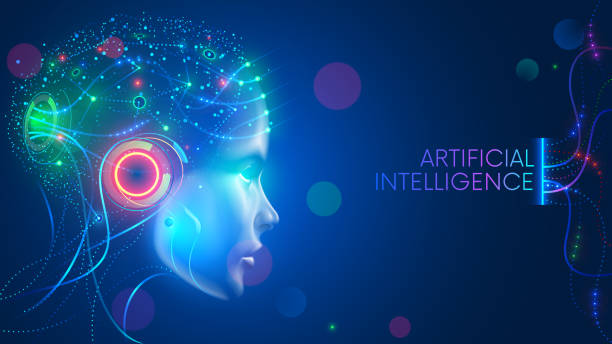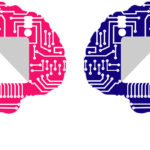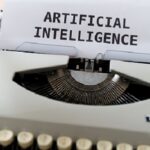Artificial intelligence (AI) is the ability of a digital computer or computer-controlled robot to perform tasks commonly associated with intelligent beings.
In addition, John McCarthy defined AI a decades ago as ” It is the science and engineering of making intelligent machines, especially intelligent computer programs. It is related to the similar task of using computers to understand human intelligence, but AI does not have to confine itself to methods that are biologically observable.”
In short, the intelligence demonstrated by machines is known as artificial intelligence.
Stuart Russell and Peter Norvig said that there are four potential goals of AI, it differentiates computer systems on the basis of rationality and thinking vs. acting:
Human approach:
- Systems that think like humans
- Systems that act like humans
Ideal approach:
- Systems that think rationally
- Systems that act rationally

In other words AI means
- An intelligent entity created by humans.
- Able to perform tasks skillfully without explicit instructions.
- Capable of thinking and acting rationally and humanly.
Types of artificial intelligence
- Reactive Machines.
- Limited Memory.
- Theory of Mind
- Artificial Narrow Intelligence (ANI)
- Self-Aware.
- Artificial General Intelligence.
- Artificial Super Intelligence (ASI)
Why is AI important?
AI is important because it is the first time in software that human capacity can be traditionally taken.
It enables human abilities such as understanding, reasoning, planning and communication to work through software.
Moreover, today, the ability to make complex decisions, interpret and make decisions based on the amount of data generated by humans and machines is beyond the capacity of human beings.
In addition, artificial intelligence is seen as central to the digital transformation of society.
Moreover, future applications are expected to bring about enormous changes. But, AI is already present in our everyday lives.
How AI works?
So, AI works by combining large amounts of data with fast, iterative processing and intelligent algorithms. Firstly, it allows the software to learn automatically from patterns in the data.
Secondly, AI is a broad field of study that includes many theories, methods and technologies.
Therefore, we need to deep dive into the various sub domains of artificial intelligence. In other words, we need to understand how those domains could be applied into the various fields.
- Machine Learning :
ML teaches a machine how to make inferences and decisions based on past experience. So, this automation saves human time to reach conclusions by evaluating data. And, helps them to make a better decision.
- Deep Learning :
It is an ML technique. It teaches a machine to process inputs through layers. Then classify it and predict the outcome.
- Neutral Networks :
It is made up of interconnected units that processes information. The process requires multiple passes to find connections and make sense of undefined data.
- Natural Language Processing :
NLP is the ability of computers to analyze, understand and generate human language, including speech. Therefore, once the machine understands what the user intends to communicate, they respond accordingly.
- Cognitive computing :
It strives for a human-like interaction with machines. To clarify, the ultimate goal is to simulate human processes by machine through the ability to interpret images and speech. And then to speak consistently in response.
- Computer vision :
It tries to understand an image by breaking it. This helps the machine classify and learn from a set of images, to make a better output.
How do we measure if artificial intelligence behaves like a human?
We can base the human-likeness of an AI entity with the:
- Turing Test
- The Cognitive Modelling Approach
- The Law of Thought Approach
- The Rational Agent Approach
AI in everyday life
consequently, below are some applications of AI
- Online shopping and advertising
- Speech Recognition
- Digital personal assistants
- Machine translations
- Computer Vision
- Cars
- Cybersecurity
Summary
In conclusion, AI is at the center of the new enterprise for building computer models of intelligence.
In short, in this article, we illustrate what is artificial intelligence, how AI can be applied to multiple processes. Also, we have seen why it is important and more.










[…] Glass offers an augmented reality experience by using visual, audio and location-based inputs to provide relevant information. For […]
[…] chatbot is an artificial intelligence (AI) program that can simulate a conversation (or a chat) with a user in natural language through […]
[…] is paving the way for a plethora of new scientific discoveries and advancements. Artificial intelligence, 3D printing, self-driving vehicles, and robots are just a few examples. As a result, technology has […]
[…] Intelligent Process Automation (IPA) is a set of tools for managing, automating, and integrating digital processes. The three main technologies that make up IPA are Digital Process Automation (DPA), Robotic Process Automation (RPA), and Artificial Intelligence (AI). […]
[…] Artificial Intelligence has surpassed many of its former boundaries as BrainGate introduces the first computer chip that can wirelessly connect a human brain to a computer. […]
[…] operation model, organisations can employ internet of effects detectors and artificial intelligence (AI) monitoring technologies. In the data centre, AI-powered widgets can also handle heating, cooling, […]